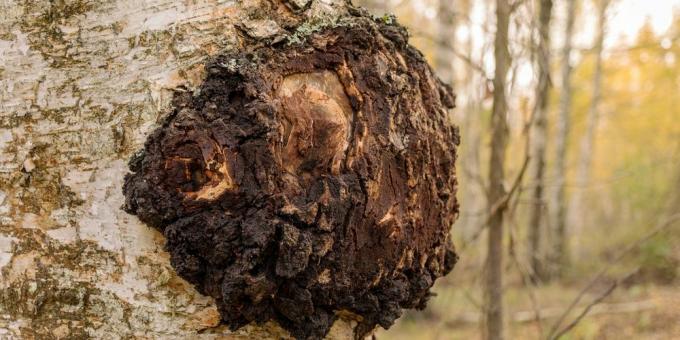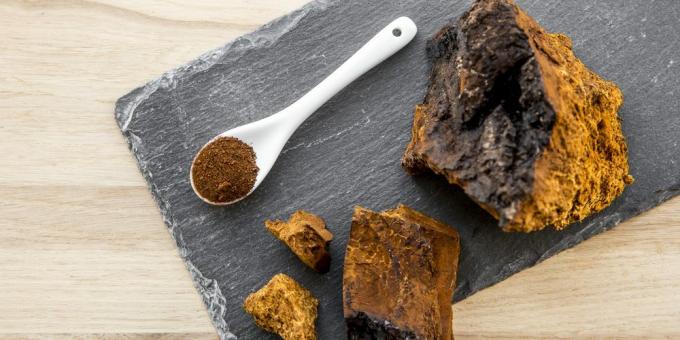Useful properties of chaga: what scientists think
Miscellaneous / / August 01, 2021
Perhaps it helps with coronavirus. But it is not exactly.
What is chaga
ChagaChaga / Biological Encyclopedic Dictionary (Inonotus obliquus) is a parasitic fungus that grows on damaged trees. Most often, birch trees, hence the second name - black birch mushroom. However, it can also affect other plants - for example, alder, maple, ash.

Chaga is a killer mushroom. Its growth leads to the fact that the affected tree begins to rot from the inside and eventually dies.
However, traditional medicine aficionados have been using the parasite for centuries to restore health.
What are the beneficial properties of chaga
Outside, chaga looks like a black, hard outgrowth of irregular shape, but inside the mushroom has a warm brown tint and a fragile woody structure. Chaga is easy to grind, and people make tea or tinctures from the resulting powder.

CountsM. Ya. Shashkina, P. N. Shashkin, and A. V. Sergeev. Chemical and medicobiological properties of chaga (review) / Pharmaceutical Chemistry Journalthat such drinks support the immune system, stop the development of inflammation and tumors, help with diabetes and heart disease, and improve overall health.
Some of the therapeutic properties of the mushroom are indeed possible. So, it contains a huge amount of the pigment melanin - a powerful antioxidant. Chaga also contains a lot of fiber, vitamin D, iron, magnesium, potassium, manganese and calcium.
In theory, such a composition can really help the body to resist certain diseases. However, in practice, there is no convincing evidence that chaga can act as an alternative to drugs. Here is what is known about the beneficial properties of chaga today.
Possibly strengthens the immune system and reduces inflammation
Inflammation is the natural response of the immune system to invading viruses, bacteria, or foreign substances. As such, this response is helpful. But if the inflammatory process is delayed and becomes chronic, it can causeGeorge M. Slavich. Understanding inflammation, its regulation, and relevance for health: A top scientific and public priority / Brain, Behavior, and Immunity cardiovascular and autoimmune diseases. For example, rheumatoid arthritis.
Animal and test tube studies show that chaga extract:
- improves 1. Yeon-Ran Kim. Immunomodulatory Activity of the Water Extract from Medicinal Mushroom Inonotus obliquus / Mycobiology.
2. Suk-kyung Ko, Mirim Jin, Myoung-yun Pyo. Inonotus obliquus extracts suppress antigen-specific IgE production through the modulation of Th1 / Th2 cytokines in ovalbumin-sensitized mice / Journal of Ethnopharmacology. production of useful cytokines - specialized proteins that play an important role in the functioning of the immune system. That is, it increases the body's ability to resist infections; - reduces 1. Yeon-Ran Kim. Immunomodulatory Activity of the Water Extract from Medicinal Mushroom Inonotus obliquus / Mycobiology.
2. Siddhartha Kumar Mishra, Ju-Hee Kang, Dong-Kyu Kim, Seung Hyun Oh, Mi Kyung Kim. Orally administered aqueous extract of Inonotus obliquus ameliorates acute inflammation in dextran sulfate sodium (DSS) -induced colitis in mice / Journal of Ethnopharmacology. the production of harmful cytokines that can cause an overly violent or protracted inflammatory response.
That is, in theory, chaga extract can strengthen immunity and reduce chronic inflammation in humans. However, in practice, such experiments have not been carried out.
Maybe inhibits tumor growth
Here is the same story as in the paragraph above. Test-tube and animal studies generally support the possible anti-cancer activity of chaga.
For example, scientists added chaga supplements to the diet of mice with cancer. And after three weeks we found outSatoru Arata, Jun Watanabe, Masako Maeda, Masato Yamamoto, Hideto Matsuhashi, Mamiko Mochizuki, Nobuyuki Kagami, Kazuho Honda, and Masahiro Inagaki. Continuous intake of the Chaga mushroom (Inonotus obliquus) aqueous extract suppresses cancer progression and maintains body temperature in mice / Heliyonthat the size of tumors in rodents decreased by an average of 60%. The number of metastases in the same animals decreased by 25%.
In another experiment with a test tube, it was foundMyung ‑ Ja Youn, Jin ‑ Kyung Kim, Seong ‑ Yeol Park, Yunha Kim, Se ‑ Jin Kim, Jin ‑ Seok Lee, Kyu ‑ Yun Chai, Hye ‑ Jung Kim, Ming ‑ Xun Cui, Hong ‑ Seob So, Ki‑ Young Kim, Raekil Park. Chaga mushroom (Inonotus obliquus) induces G0 / G1 arrest and apoptosis in human hepatoma HepG2 cells / World Journal of Gastroenterologythat chaga extract prevented the growth of cancer in human liver cells. Similar Results Were Observed in Colon Cancer CellsSung Hak Lee, Hee Sun Hwang, Jong Won Yun. Antitumor activity of water extract of a mushroom, Inonotus obliquus, against HT ‑ 29 human colon cancer cells / Phytotherapy Research, lung, stomach, breast, cervixMi Ja Chung, Cha-Kwon Chung, Yoonhwa Jeong, Seung-Shi Ham. Anticancer activity of subfractions containing pure compounds of Chaga mushroom (Inonotus obliquus) extract in human cancer cells and in Balbc / c mice bearing Sarcoma ‑ 180 cells / Nutrition Research and Practice.
But the results of in vitro studies, as well as experiments with mice, cannot be directly transferred to humans. Therefore, it is too early to say in what doses a birch mushroom should be taken in order to achieve an anti-cancer effect.
In addition, scientists are not yet sure whether this effect is possible in humans at all.
It is possible that it lowers blood sugar levels
When chaga extract was suggestedJia Wang, Cong Wang, Shuqin Li, Weiwei Li, Guoqi Yuan, Yuxiang Pan, Haixia Chen. Anti-diabetic effects of Inonotus obliquus polysaccharides in streptozotocin-induced type 2 diabetic mice and potential mechanism via PI3K ‑ Akt signal pathway / Biomedicine and Pharmacotherapy In mice suffering from obesity and diabetes, after a while the level of sugar in the animals' blood dropped, and their insulin sensitivity increased. The effect was so obvious that the authors of the work even suggested that the birch mushroom could be a promising candidate for drugs for the treatment of diabetes.
There are a million such studies, but with them the same problem as with those listed in the paragraphs above. All of them were carried out in animals or in test tubes. And how things are with a person is still completely incomprehensible.
Chaga can also be effective against coronavirus.
At the end of last year, scientists at the Vector Center for Virology and Biotechnology (Novosibirsk) reportedBirch mushroom suppressed the multiplication of coronavirus particles / TASS. The sciencethat in their experiments, chaga extract suppressed the multiplication of coronavirus in living cells. The experiments were again carried out in a test tube.
However, this story did not find any continuation.
When chaga can be dangerous
This is also not entirely clear. Evidence-based medicine has little interest in parasitic fungi as drugs. Therefore, neither the benefits nor the side effects of chaga have been seriously studied.
You can only make assumptions. For example, there is a lot of oxalate in a birch mushroom. This is the name of a chemical compound that interferes with the absorption of nutrients and is able to quickly bind with calcium, forming stones in the kidneys. People who abuse chaga powder even recordedYuko Kikuchi, Koichi Seta, Yayoi Ogawa, Tatsuya Takayama, Masao Nagata, Takashi Taguchi, Kensei Yahata. Chaga mushroom-induced oxalate nephropathy / Clinical Nephrology, cases of renal failure. Therefore, if you have kidney stones or suspicion of them, it is better to refuse experiments with a birch mushroom.
Chaga also contains a protein that degradesKwang Wook Hyun, Seung Chan Jeong, Dae Hyoung Lee, Jeong Sik Park, Jong Soo Lee. Isolation and characterization of a novel platelet aggregation inhibitory peptide from the medicinal mushroom, Inonotus obliquus / Peptides. blood clotting. So if you are taking blood thinners, have a clotting disorder, or are preparing for surgery, taking birch mushroom tincture is a dangerous choice. At a minimum, it should be discussed with your therapist or other supervising doctor.
In addition, chaga should not be consumed.Chaga (Inonotus obliquus) / Vidal. Directory of medicines pregnant, lactating women and children under 18 years of age.
The biggest danger, however, is the temptation to use chaga instead of the medication prescribed by your doctor.
It's one thing if you're brewing birch mushroom tea in an attempt to boost your immune system. This is likely to be just harmless (and not the fact that useful) entertainment. It is quite different if you are trying to cure something serious with chaga, such as cancer. Don't do that! The effectiveness of this remedy has not been confirmed. There are no scientifically proven doses that could have any effect on the tumor. Therefore, relying on chaga, you risk losing time - and one day you will find that the neoplasm has become inoperable and it is impossible to get rid of it.
So, the most important rule: chaga is not a cure!
But if you want to try taking a mushroom just to maintain health (what if the immune system will strengthen?), It is permissible to do so.
How to use chaga
There is no scientific recommendation for obvious reasons. Therefore, read the instructions on the packaging of the chaga dietary supplement and follow it.
The most convenient way to drink tea made from birch mushroom is to buy a pack of disposable tea bags and brew with boiling water in a cup.
If you get a whole mushroom, break it into pieces about 2–3 cm in size. Pour 4-5 pieces with a liter of hot water and simmer over low heat for 15 minutes to 3 hours. The longer you cook chaga, the deeper its flavor will be. Some people like a darker and stronger drink - like coffee. Others like the quick and light tea-like infusion.
To make the liquid taste more pleasant, you can add a little sugar or honey to it.
Read also💊🌿
- Do you need badger fat
- What is beaver spray and is it worth drinking
- Does bear bile really save you from cancer and hepatitis?
- Is milk thistle as useful as it is commonly believed?
- Is St. John's wort really as useful as it is commonly believed?
Scientists talk about dozens of COVID-19 symptoms that can persist for more than 6 months
Scientists have named the characteristic symptoms of the delta strain of coronavirus. They are different from the usual COVID-19


